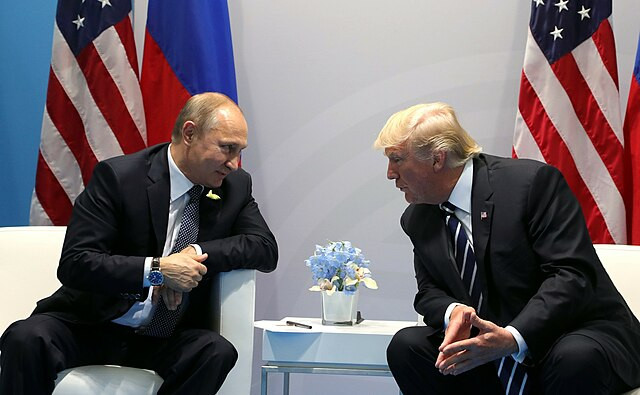President Donald Trump confirmed plans to speak directly with Russian President Vladimir Putin on Tuesday to discuss ending the ongoing war in Ukraine, emphasizing that negotiations have already broached sensitive topics such as the division of territory and control over power plants. Trump's comments underscore a U.S.-led push for a 30-day ceasefire, which Ukraine has agreed to, even as Russian forces continue advancing in contested areas.
"I'll be speaking to President Putin on Tuesday. A lot of work's been done over the weekend," Trump told reporters aboard Air Force One during a flight from Florida. "We want to see if we can bring that war to an end. Maybe we can, maybe we can't, but I think we have a very good chance."
Trump added that discussions had already delved into concrete concessions. "We will be talking about land. We will be talking about power plants," he said. "I think we have a lot of it already discussed very much by both sides, Ukraine and Russia. We are already talking about that, dividing up certain assets."
Kremlin spokesperson Dmitry Peskov confirmed the scheduled call but declined to elaborate on the agenda. The talks follow several hours of discussions last week between Trump's special envoy Steve Witkoff and Putin, which Witkoff described as "positive" and "solution-based." According to Witkoff, Putin "accepts the philosophy" behind Trump's ceasefire proposal.
Despite these diplomatic overtures, significant hurdles remain. Russian Deputy Foreign Minister Alexander Grushko reiterated Moscow's longstanding demands on Monday, telling Russian outlet Izvestia: "We will demand that ironclad security guarantees become part of this agreement. Part of these guarantees should be the neutral status of Ukraine, the refusal of Nato countries to accept it into the alliance."
Grushko further rejected any prospect of foreign military presence in Ukraine post-conflict. "It does not matter under what label Nato contingents were to be deployed on Ukrainian territory: be it the European Union, Nato, or in a national capacity ... If they appear there, it means that they are deployed in the conflict zone with all the consequences for these contingents as parties to the conflict."
French President Emmanuel Macron pushed back on Moscow's stance Sunday, emphasizing that Russia lacks veto power over Ukrainian sovereignty. "If Ukraine requests allied forces to be on its territory, it is not up to Russia to accept or reject them," Macron told French newspapers.
Meanwhile, fighting continues unabated. Over the weekend, both Ukraine and Russia exchanged heavy aerial strikes, with Russian forces making gains in the western Russian region of Kursk, where Ukrainian troops had maintained a presence for the past seven months. The Ukrainian military has gradually retreated in portions of the region, though Kyiv still views the area as a critical bargaining chip in negotiations.
Adding to Ukraine's challenges, images broadcast on Russian state media showed intensified Russian assaults, supported by North Korean troops and aided by the Trump administration's temporary suspension of military and intelligence assistance to Kyiv. The Russian Defense Ministry announced Monday it had destroyed 72 Ukrainian drones overnight and seized control of the village of Stepove in southeastern Ukraine.
Inside Russia, ultra-nationalist factions have warned Putin against agreeing to any ceasefire. Last week, Putin's foreign policy adviser Yuri Ushakov dismissed the U.S.-Ukraine proposal as "nothing else than a temporary respite for the Ukrainian military, nothing more."
Ukrainian President Volodymyr Zelenskyy accused Moscow of prolonging the conflict. "The buildup of Russian forces indicates that Moscow intends to keep ignoring diplomacy," Zelenskyy said Saturday on X. In an effort to boost Ukraine's military readiness, Zelenskyy announced on Sunday the appointment of Andriy Gnatov as the new chief of general staff, replacing Anatoliy Bargylevych. "He is a combat guy," Zelenskyy said of Gnatov, adding that the move is aimed at improving operational efficiency and coordination.
Defence Minister Rustem Umerov echoed the restructuring goals, stating: "We are systematically transforming the Armed Forces of Ukraine to enhance their combat effectiveness. This involves restructuring the command system and implementing clear standards."
Adding to the flurry of diplomatic activity, U.S. Secretary of State Marco Rubio held a phone call Sunday with Russian Foreign Minister Sergei Lavrov, following their meeting in Riyadh last month. The Russian Foreign Ministry said the pair discussed "concrete aspects of the implementation of understandings" reached at the summit but did not explicitly mention the ceasefire plan. A U.S. State Department spokeswoman confirmed the call, stating they "discussed the next steps" on Ukraine and agreed to continue dialogue.
British Prime Minister Keir Starmer, during a virtual summit on Ukraine the same day, criticized Moscow's reluctance to commit to peace. "The 'yes, but' from Russia is not good enough," Starmer said. "We need to stop the barbaric attacks on Ukraine once and for all."
European Union foreign policy chief Kaja Kallas offered a sharp assessment of Russia's conditions, telling reporters Monday: Moscow "don't really want peace, actually, because they are presenting as conditions all their ultimate goals that they want to achieve from the war."





